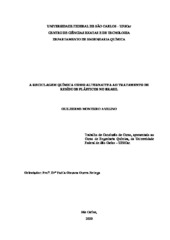| dc.contributor.author | Avelino, Guilherme Monteiro | |
| dc.date.accessioned | 2021-01-11T19:27:02Z | |
| dc.date.available | 2021-01-11T19:27:02Z | |
| dc.date.issued | 2020-12-15 | |
| dc.identifier.citation | AVELINO, Guilherme Monteiro. A reciclagem química como alternativa ao tratamento de resíduos plásticos no Brasil. 2020. Trabalho de Conclusão de Curso (Graduação em Engenharia Química) – Universidade Federal de São Carlos, São Carlos, 2020. Disponível em: https://repositorio.ufscar.br/handle/ufscar/13660. | * |
| dc.identifier.uri | https://repositorio.ufscar.br/handle/ufscar/13660 | |
| dc.description.abstract | Recycling is a process carried out in the transformation of products. This can be done mechanically, chemically and energetically. In each of the defined types there are different processes, as well as the final products and raw materials. Given this, the present study sought to understand the challenges that gasification, as a chemical recycling methodology, faced in Brazil and how they can be overcome so that this method is a viable alternative with mechanical recycling, in order to improve waste treatment plastics in our country. To this end, the study started from a bibliographic review about mechanical recycling and chemistry in Brazil, critically analyzing some processes and the variables that involve them, in addition to discussing the social, economic and environmental impacts that each treatment has. The results obtained allowed us to conclude that mechanical recycling is the main recycling resource carried out in Brazil. Mechanical recycling is financially more effective when compared to the other two types of recycling practiced, in addition to providing employability in the sector. It was also found that reverse logistics, guaranteed by law, allows the right destination for the treatment of solid waste, and should be further explored. However, it must be considered that mechanical recycling has variables that hinder its use, since certain plastic residues cannot be recycled by this processing. Thus, investment in chemical recycling is necessary, but the financial demand that it requires is understood. Sustainability is highlighted as a major factor in this scenario, and should be considered in the different recycling processes. Finally, it is concluded that gasification, explored by the researcher in this study, presents itself as an alternative for the treatment of plastic waste, thus, the need for further exploratory studies in the researched area is stated. | por |
| dc.description.sponsorship | Não recebi financiamento | por |
| dc.language.iso | por | por |
| dc.publisher | Universidade Federal de São Carlos | por |
| dc.rights | Attribution-NonCommercial-NoDerivs 3.0 Brazil | * |
| dc.rights.uri | http://creativecommons.org/licenses/by-nc-nd/3.0/br/ | * |
| dc.subject | Reciclagem; Reciclagem Química; Reciclagem Mecânica; Gaseificação; Resíduos Plásticos | por |
| dc.subject | Recycling; Chemical Recycling; Mechanical Recycling; Gasification; Plastic Waste | por |
| dc.title | A reciclagem química como alternativa ao tratamento de resíduos plásticos no Brasil | por |
| dc.title.alternative | Chemical Recycling as an Alternative to the Treatment of Plastic Waste in Brazil. | por |
| dc.type | TCC | por |
| dc.contributor.advisor1 | Béttega, Vádila Giovana Guerra | |
| dc.contributor.advisor1Lattes | http://lattes.cnpq.br/0752059622240208 | por |
| dc.description.resumo | A reciclagem é um processo realizado na transformação de produtos. Esta pode ser realizada de forma mecânica, química e energética. Em cada um dos tipos delimitados encontra-se processos diferenciados, bem como os produtos e matérias-primas finais. Diante disto, o presente estudo buscou compreender os desafios que a gaseificação, enquanto metodologia de reciclagem química, enfrentada no Brasil e como eles podem ser superados para que esse método seja uma alternativa viável junto a reciclagem mecânica, de modo a melhorar o tratamento de resíduos plásticos em nosso país. Para tanto, o estudo partiu de uma revisão bibliográfica acerca da reciclagem mecânica e a química no Brasil, analisando criticamente alguns processos e as variáveis que os envolvem, além de discorrer sobre os impactos sociais, econômicos e ambientais que cada tratamento possui. Os resultados obtidos permitiram concluir que a reciclagem mecânica encontra-se como principal recurso de reciclagem realizado no Brasil. A reciclagem mecânica é financeiramente mais efetiva quando comparado aos outros dois tipos de reciclagem praticados, além de propiciar empregabilidade no setor. Constatou-se também que a logística reversa, garantida por lei, possibilita o destino certo para o tratamento de resíduos sólidos, devendo ser maior explorada. Entretanto, há que se considerar que a reciclagem mecânica apresenta variáveis que dificultam o seu uso, uma vez que determinados resíduos plásticos não podem ser reciclados por este processamento. Assim, torna-se necessário o investimento em reciclagem química, porém compreende-se a demanda financeira que a mesma exige. Ressalta-se a sustentabilidade como fator preponderante neste cenário, devendo ser considerado nos diferentes processos de reciclagem. Por fim, conclui-se que a gaseificação, explorada pelo pesquisador neste estudo, apresenta-se como uma alternativa para o tratamento de resíduos plásticos, assim, afirma-se a necessidade de maiores estudos exploratórios na área pesquisada. | por |
| dc.publisher.initials | UFSCar | por |
| dc.subject.cnpq | ENGENHARIAS::ENGENHARIA QUIMICA::PROCESSOS INDUSTRIAIS DE ENGENHARIA QUIMICA | por |
| dc.publisher.address | Câmpus São Carlos | por |
| dc.contributor.authorlattes | http://lattes.cnpq.br/4660496404170427 | por |
| dc.publisher.course | Engenharia Química - EQ | por |

